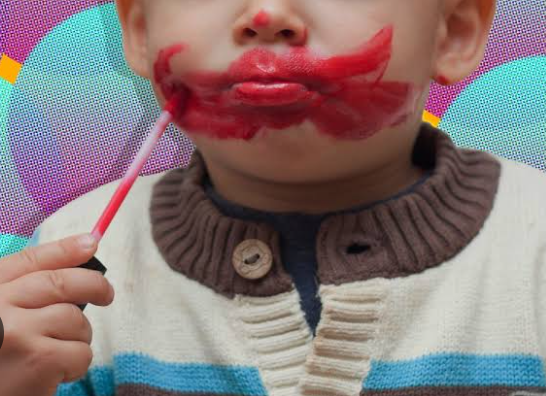
Father Sparks Outrage After Admitting He Slapped His 3-Year-Old Son for Applying Lipstick

In a dramatic revelation that has ignited fierce debate across social media, a man identified as Bayelsa Cruise Merchant with the handle @KingErefitei took to X (formerly Twitter) to share an incident that has now spiraled into controversy. The man narrated how he slapped his three-year-old son after catching him applying his mother’s lipstick. According to him, such an act reminded him of popular crossdressers and LGBTQ figures in Nigeria such as Bobrisky and James Brown, and he made it clear that he would not allow anything of that sort to “happen in his lineage.” His words have since become a lightning rod for arguments, criticisms, and divided opinions on parenting, masculinity, and gender expression in Nigerian society.
The man’s post, which quickly gained traction, read: “Saw my 3yr old son applying his mother’s lipstick on his lips this morning. I had to activate a moderate loud slap on him. That’s how Bobrisky, James Brown, Eniola and ‘Emeka the feminists defender’ started. That rubbish can’t happen in my lineage.” The post, framed in a mix of humor and stern parenting, might have been intended as banter, but many did not find it funny at all. Instead, it opened the floodgates to discussions around child discipline, toxic masculinity, gender norms, and whether slapping a toddler for such a harmless act could ever be justified.
Reactions online were swift and polarizing. On one hand, some individuals, particularly those with strong conservative views, hailed the man’s quick action as a way of “nipping deviant behavior in the bud.” They argued that Nigerian fathers must be vigilant in guarding their sons against what they see as the encroaching influence of alternative gender identities and Western ideals of sexuality. For these people, the lipstick episode represented more than just child’s play; it symbolized what they perceive as a slippery slope toward non-heteronormative lifestyles, which they consider unacceptable in their cultural or religious beliefs. Supporters of the father’s stance flooded his comment section with remarks like “Good one, bro, you’re raising your son like a real man” and “That’s how to be a father, you don’t allow nonsense to start small.”
On the other hand, critics wasted no time in calling out the man’s action as abusive, unnecessary, and deeply troubling. They stressed that a three-year-old child is at an age of innocence, curiosity, and experimentation, where play often involves imitating parents, siblings, and caregivers without any understanding of gender constructs or sexuality. To slap a child for such harmless behavior, they argued, could instill fear, shame, and trauma rather than “discipline.” One user commented: “So your son plays with lipstick like a toy, and instead of correcting him with love, you beat him? That’s not parenting; that’s abuse.” Others went further, accusing the man of projecting his own insecurities and prejudices onto an innocent child, warning that such harsh actions could strain the father-son relationship in the long run.
The issue also sparked conversations about how deeply entrenched gender roles are in Nigerian households. From a young age, boys are often discouraged from engaging in anything deemed “feminine,” while girls are similarly barred from “masculine” expressions. Critics pointed out that lipstick in itself is just a cosmetic product, yet in many African societies it becomes a powerful symbol of femininity, leading parents to panic if their sons are seen experimenting with it. They argued that children learn by copying adults, and if a boy sees his mother applying lipstick, his attempt to do the same is no different from a girl trying on her father’s shoes or cap. The real question, they said, is why adults interpret such innocent mimicry through the lens of sexuality and morality.
Psychologists and child development experts who joined the online discussion emphasized that early childhood exploration should never be punished with physical violence. According to them, children at that age have no concept of sexual identity; they are simply testing boundaries, learning roles, and playing pretend. Punishment in such cases, they warned, could lead to confusion, internalized shame, and even rebellion in later years. Instead, they suggested gentle guidance, redirection, and open communication as better tools for parenting. One mental health advocate tweeted: “Beating a 3-year-old for using lipstick is not protection; it is projection. Parents need to heal their own fears before transferring them to children.”
The cultural undertone of the debate cannot be ignored. In Nigeria, discussions around gender, sexuality, and non-conformity are highly sensitive, often laced with religious morality and cultural pride. The mention of Bobrisky and James Brown in the father’s post is telling, as these two figures remain lightning rods in Nigerian society. For many conservatives, they symbolize the “moral decline” of modern youth, while for others they represent freedom of expression and defiance against rigid gender norms. By linking his son’s lipstick experiment to these controversial personalities, the father reinforced a fear-based narrative: that a single playful act could somehow determine a child’s entire sexual orientation or identity.
As the online storm rages on, some neutral voices have attempted to bring balance to the discourse. They argue that while the father’s method was extreme, his fear comes from a place of cultural conditioning and protective instincts. Many Nigerian fathers, they note, are grappling with rapid societal changes, where the visibility of LGBTQ communities and gender non-conformity is increasing despite traditional norms. To them, the slap was less about cruelty and more about panic, reflecting how ill-prepared many parents are to navigate conversations about identity in today’s world.
Still, the overwhelming sentiment among child rights advocates is that the action was wrong and damaging. Several voices called for a shift away from corporal punishment in Nigeria, urging parents to embrace more nurturing approaches. Some even suggested that such incidents highlight the need for public sensitization about child psychology and the dangers of equating gender expression with morality or sexuality.
Interestingly, the man at the center of the controversy has not shown signs of regret. Instead, he doubled down on his comments, suggesting that he would do it again if necessary. This defiance further polarized reactions, with critics labeling him stubborn and unteachable, while supporters praised his consistency as a “real man who knows what he wants for his family.” Whether or not he anticipated the scale of backlash, one thing is clear: his story has forced Nigerians to confront the uncomfortable intersection of parenting, gender, and societal values.
In the end, the incident has gone beyond just one man and his son. It has become a mirror reflecting Nigeria’s ongoing struggle with evolving definitions of masculinity, childhood innocence, and the rights of children to explore the world without fear. While some applaud the father’s firmness, others see in his action a warning about the dangers of ignorance, fear, and violence masquerading as discipline.
As the debate continues, one is left with a haunting question: what happens to children when their first lessons in identity are delivered with the sting of a slap instead of the warmth of understanding?


